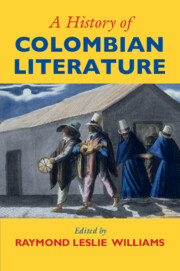Book contents
- Frontmatter
- Contents
- Notes on contributors
- Preface
- Introduction
- PART I LITERATURE AND SOCIETY IN COLOMBIA
- PART II COLOMBIAN CULTURE AND SOCIETY IN REGIONAL CONTEXTS
- PART III BEYOND THE BOUNDARIES
- 15 García Márquez as public intellectual
- 16 Women writers in Colombia
- 17 Colombian queer narrative
- 18 Extracting nature: toward an ecology of Colombian narrative
- 19 Visions of nature: Colombian literature and the environment from the colonial period to the nineteenth century
- 20 The intersections between poetry and fiction in two Colombian writers of the twentieth century: Álvaro Mutis and Darío Jaramillo Agudelo
- AFTERWORDS
- Index
- References
20 - The intersections between poetry and fiction in two Colombian writers of the twentieth century: Álvaro Mutis and Darío Jaramillo Agudelo
from PART III - BEYOND THE BOUNDARIES
Published online by Cambridge University Press: 05 June 2016
- Frontmatter
- Contents
- Notes on contributors
- Preface
- Introduction
- PART I LITERATURE AND SOCIETY IN COLOMBIA
- PART II COLOMBIAN CULTURE AND SOCIETY IN REGIONAL CONTEXTS
- PART III BEYOND THE BOUNDARIES
- 15 García Márquez as public intellectual
- 16 Women writers in Colombia
- 17 Colombian queer narrative
- 18 Extracting nature: toward an ecology of Colombian narrative
- 19 Visions of nature: Colombian literature and the environment from the colonial period to the nineteenth century
- 20 The intersections between poetry and fiction in two Colombian writers of the twentieth century: Álvaro Mutis and Darío Jaramillo Agudelo
- AFTERWORDS
- Index
- References
Summary
The exploration of the poetic qualities of a novel is a task that necessarily acknowledges a considerable number of variants. The genre of the novel offers an open space for literary and nonliterary discourses in which lyric development may be intertwined with plot development and narrative devices. Moreover, a “poetic novel” tends to relate the physical world of objects with symbolic imagery to give the writer the opportunity to explore concepts such as memory, destiny, or the human condition. Moving beyond these matters, in this chapter I explore how poet-novelists not only encase passages of lyrical beauty or create allegory in their prose, but also how they consciously reflect on the act of writing and document those spontaneous strategies that occur as they go through the process of writing a novel. Consequently, a poet-novelist constantly makes use of a “mask” portrayed as a central narrative voice, which meditates on the process of finding the hidden meanings in a story not by telling but by writing and editing the text we are reading. Through the extensive use of metafiction, intertextuality (on occasions, self-referential), and procedures that connect symbolic images to plot and character development, a poet uses a novel as “a laboratory in which he develops narrative strategies, elaborates on personal sets of symbols, and refines themes that are employed in later novels.”
Colombian literature in the twentieth century offers a fertile ground to explore the labor of poet-novelists, and, in fact, there is extensive critical commentary on the works of most of them. Seminal works in Colombian literature such as Jorge Isaac's María (1867) and José Eustasio Rivera's La vorágine (1924; The Vortex, 1928) are early examples of novels written by aspiring poets. Throughout the twentieth century, many Colombian poets tackled the genre of the novel with different degrees of success.
- Type
- Chapter
- Information
- A History of Colombian Literature , pp. 431 - 454Publisher: Cambridge University PressPrint publication year: 2016



